Immerse yourself in the tales of Gabriel and Michael, where divine messages and battles illuminate the path between darkness and light.
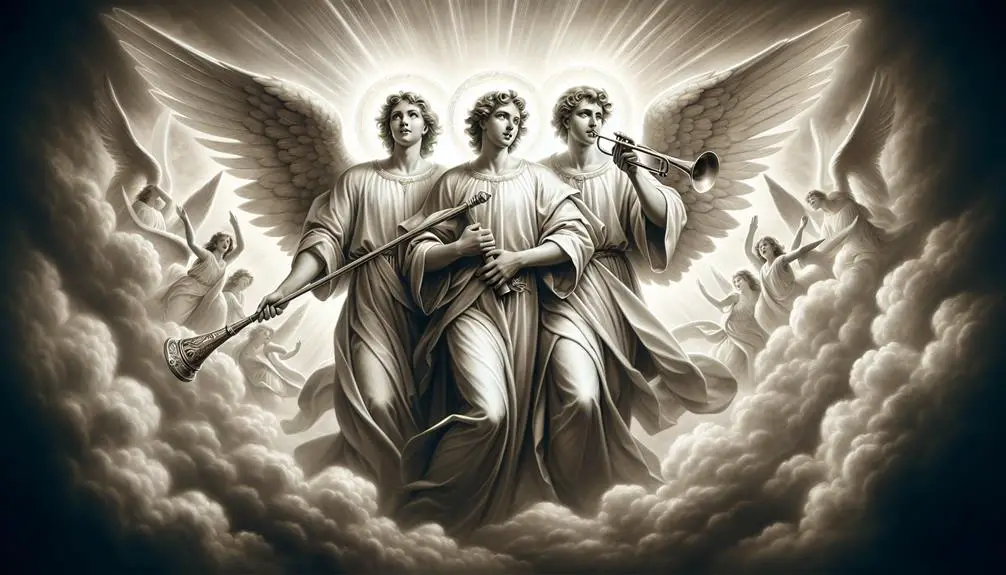
Gabriel and Michael in the Bible
Have you ever pondered the celestial hierarchy, where Gabriel and Michael stand as beacons of God's power and message? You're not alone.
These archangels play pivotal roles in biblical narratives, with Gabriel known for delivering divine announcements and Michael, a warrior, leading battles against darkness.
Their appearances span from the Old to the New Testament, embodying themes of guidance, protection, and the eternal struggle between good and evil.
As you explore their stories, you'll uncover layers of symbolism and interpretations that have influenced Christian thought for centuries.
Their significance, woven into the fabric of religious texts, beckons a closer look to understand the depth of their influence.
Key Takeaways
- Gabriel and Michael are archangels with distinct roles: Gabriel as a messenger and Michael as a protector.
- Gabriel's announcements to Zechariah and Mary highlight divine intervention in human history.
- Michael's battles, especially in the Book of Daniel and Revelation, symbolize the eternal struggle between good and evil.
- Both archangels significantly influence theological narratives and believers' understanding of divine guidance and protection.
The Role of Archangels
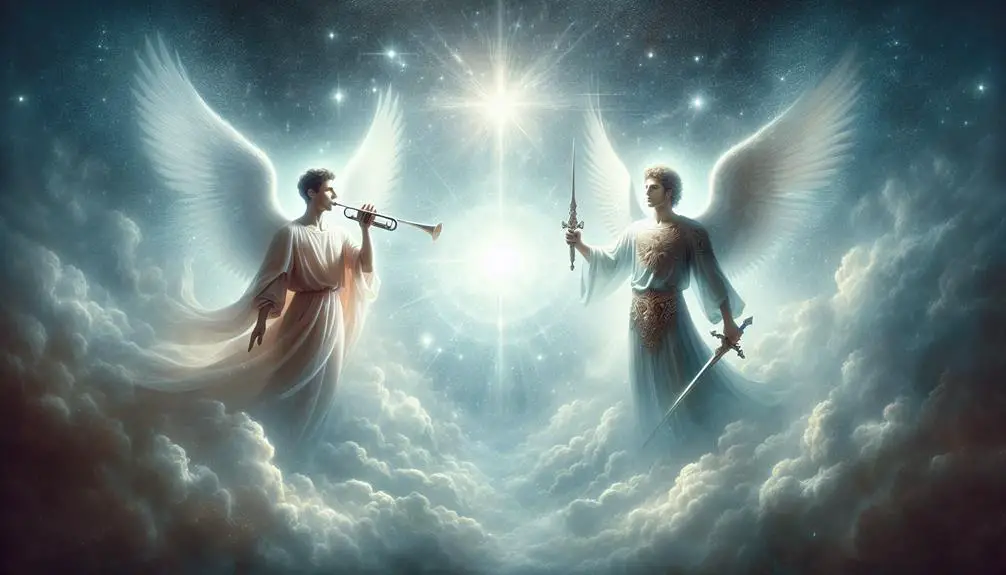
In biblical theology, archangels serve as God's primary messengers and warriors, executing divine decrees with unwavering loyalty and power. The origins of these celestial beings are deeply rooted in ancient texts, providing insights into their roles within the celestial hierarchy. You'll find that archangels aren't merely spiritual entities but are integral to the structure and function of the divine realm.
The term 'archangel' itself originates from the Greek word 'archangelos', implying a chief or leading angel. This designation suggests a hierarchical structure in the celestial realm, with archangels holding a high rank due to their critical roles. Within this hierarchy, archangels are entrusted with missions of great importance and urgency, acting as direct representatives of God's will.
Exploring the celestial hierarchy further, you'll uncover that archangels are positioned above angels in this divine order. This distinction isn't just about rank but also about the nature of their duties. While angels are often seen as guides and protectors for individuals, archangels carry out God's commands on a cosmic scale, dealing with matters that affect the entire human race and the universe.
The specificity of the roles of archangels, such as Michael and Gabriel, underscores their significance in biblical narratives. Michael is often depicted as a warrior, a defender of the faithful against evil, while Gabriel is seen as a messenger, bringing crucial announcements from God. These roles are emblematic of the archangels' overarching responsibilities in the celestial hierarchy, demonstrating their unique contributions to the fulfillment of divine will.
Gabriel's Announcements
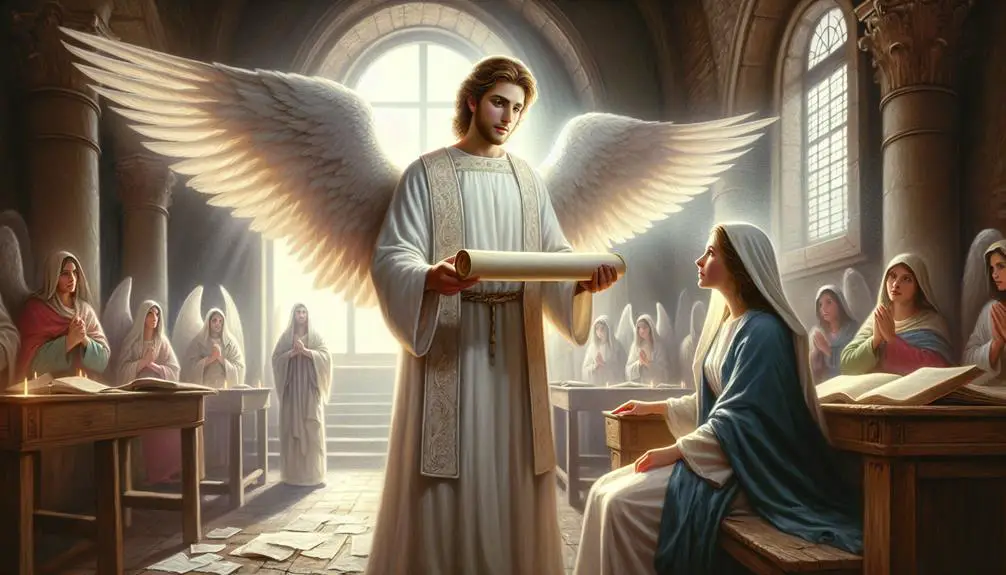
You'll find that Gabriel's role in biblical narratives is profoundly tied to the delivery of key prophecies and messages. His announcements serve not only as pivotal moments in the scriptural texts but also as foundational elements for understanding the unfolding of divine plans.
Through analyzing Gabriel's messages, you gain insights into the broader theological and eschatological frameworks within the Bible.
Gabriel's Role in Prophecy
Gabriel's role in biblical prophecies, marked by his pivotal announcements, profoundly influenced the course of religious narratives. As one of the central divine messengers, Gabriel's appearances often heralded significant moments of revelation and direction. These angelic visions were not mere spectacles; they were deeply embedded in the fabric of religious understanding, shaping the way future events were perceived and interpreted.
Aspect |
Impact |
|---|---|
Divine Messenger |
Gabriel's identity as a divine messenger places him at the heart of religious communication. |
Angelic Visions |
These visions were more than mere appearances; they were profound, symbolic messages from the divine. |
Prophetic Announcements |
Gabriel's announcements were pivotal, often signaling significant shifts in religious narratives. |
Guidance |
His messages provided guidance, shaping the actions and beliefs of individuals. |
Historical Influence |
Gabriel's role in prophecy has a lasting impact on religious history and interpretation. |
This analytical perspective reveals Gabriel's crucial role in shaping the theological landscape through his prophetic announcements.
Key Messages Delivered
Exploring the specific messages that Gabriel conveyed reveals the depth of his influence on biblical narratives and theological interpretations. As one of the primary divine messengers, his announcements are pivotal, showcasing the vast scope of angelic duties. These messages weren't merely news; they were divine interventions that shaped the course of human history and religious belief.
- Announcement to Zechariah: Foretelling the birth of John the Baptist, Gabriel's message underscored the imminent preparation for the Messiah.
- Announcement to Mary: Perhaps his most famous act, informing Mary she'd conceive Jesus, highlighting the incarnation's miraculous nature.
- Vision to Daniel: Providing understanding and prophecy about the end times, demonstrating Gabriel's role in interpreting divine will to humanity.
These instances illustrate Gabriel's central role as a conveyer of God's will, influencing both immediate circumstances and prophetic visions.
Michael's Battles
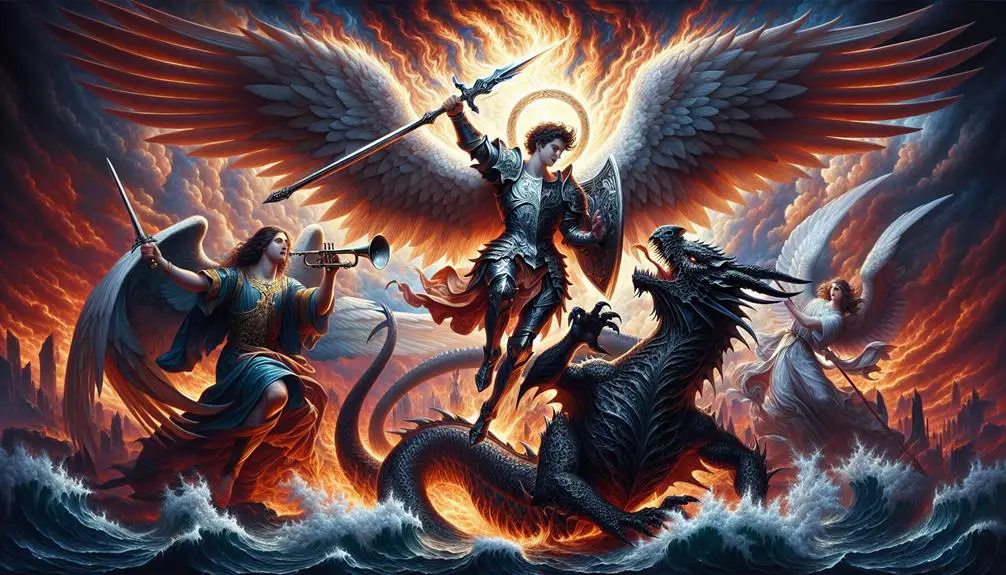
Throughout biblical narratives, Michael, known as the archangel, engages in numerous battles that underscore his role as a protector of righteousness and a warrior against evil. His loyalty to the divine mission is unwavering, positioning him as a pivotal figure within the angelic hierarchy. This loyalty isn't merely about allegiance; it exemplifies a profound commitment to the principles of justice and goodness that the hierarchy aims to uphold.
Michael's battles aren't just physical confrontations; they're emblematic of the struggle between good and evil, between the divine will and the forces that seek to undermine it. His confrontations, particularly highlighted in the Book of Daniel, where he comes to the aid of Daniel's prayers by battling the prince of the Persian kingdom, illustrate not only his martial prowess but also his strategic significance in the celestial order. This narrative showcases Michael's role as a defender of the faithful and an executor of divine justice.
In the Book of Revelation, Michael's leadership in the war in heaven against Satan and his followers further cements his role as a guardian of order and a symbol of divine authority. This battle, significant in its scope and impact, highlights the archangel's central position in the cosmic struggle against disobedience and rebellion.
Michael's engagements are thus not merely tales of conflict but are deeply embedded within the fabric of divine governance. They reflect the ongoing battle between light and darkness, a theme central to the biblical message of hope and redemption. Through his battles, Michael emerges not just as a warrior but as a beacon of the divine promise of victory over evil.
Symbolism and Interpretations
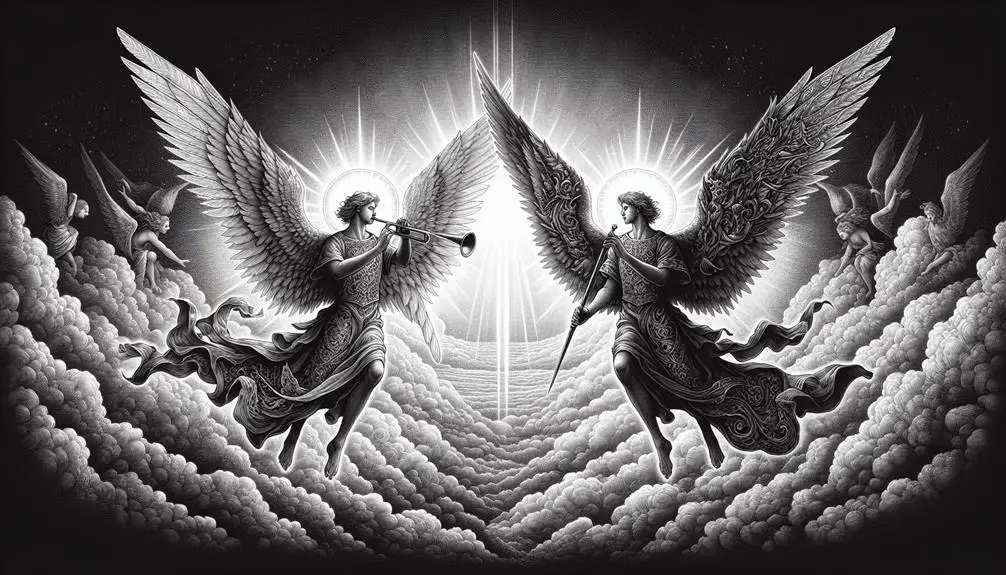
Delving into the symbolism and interpretations surrounding Gabriel and Michael reveals a rich tapestry of meanings that extend beyond their literal roles in biblical texts. These figures aren't just messengers or warriors; they embody deeper spiritual truths and serve as pivotal elements within the angelic hierarchy, offering insight into the celestial order and the dynamic between the divine and the human realms.
- Angelic Hierarchy: Gabriel and Michael's positions within the celestial hierarchy symbolize order and structure in the universe, reflecting a cosmic balance that influences both spiritual and earthly matters.
- Cultural Depictions: Across cultures, Gabriel and Michael have been depicted in various forms, from Renaissance art to modern literature, each portrayal adding layers to their symbolism and influencing how they're perceived and interpreted in contemporary spirituality.
- Dual Roles: They serve dual roles as messengers and protectors, symbolizing the multifaceted nature of divine intervention in human affairs, emphasizing themes of guidance, strength, and hope.
In scholarly analysis, the depiction of Gabriel and Michael extends beyond simple character studies to encompass broader themes of moral and spiritual guidance. Gabriel, often seen as a herald of good news, symbolizes communication and revelation, while Michael, the warrior, represents courage and the fight against evil. These interpretations have evolved over centuries, influenced by theological discourse, artistic representation, and cultural adaptation. Their enduring presence in various forms of media underscores their significant role in shaping human understanding of the divine, the nature of good vs. evil, and the complexities of the angelic hierarchy in the spiritual landscape.
Appearances in the Old Testament
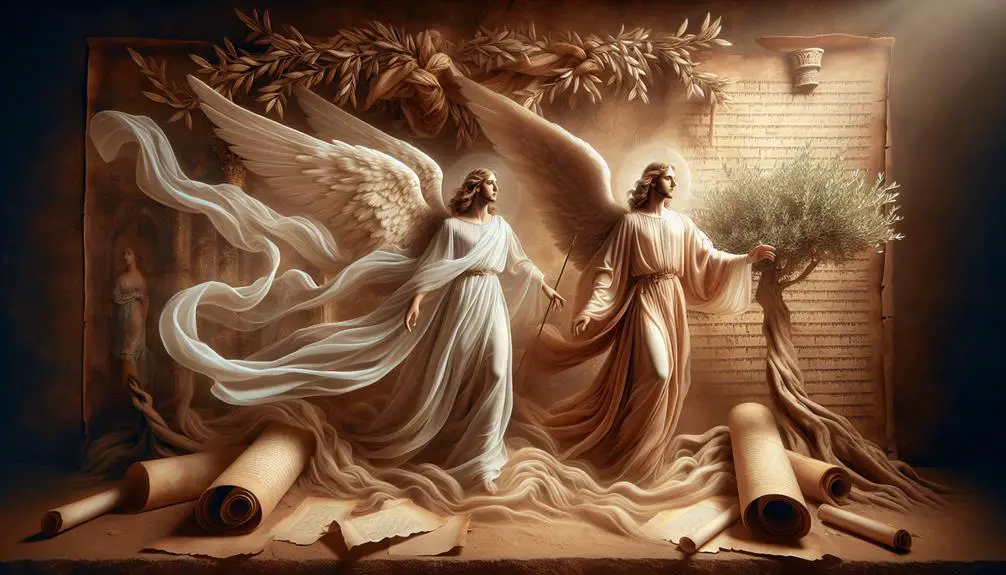
You'll find that Gabriel's role in the Old Testament is primarily that of delivering prophetic messages, a function that underscores his significance in conveying divine will to humanity.
Meanwhile, Michael is depicted as a protector, a celestial being who stands in defense of God's people against adversarial forces.
These appearances not only highlight their distinct responsibilities within the spiritual hierarchy but also offer a deeper understanding of the dynamics at play in biblical narratives.
Gabriel's Prophetic Messages
In the Old Testament, Gabriel emerges as a key messenger of God, delivering prophetic messages that have left a profound impact on biblical narrative and theology. His appearances underscore the concepts of divine timing and angelic encounters, highlighting his role in communicating God's plans to humanity.
- Divine timing: Gabriel's messages often come at pivotal moments, signaling God's precise intervention in human history.
- Angelic encounters: These events provide a rare glimpse into the interactions between the divine realm and mankind, emphasizing the importance of angelic messengers.
- Prophetic insight: Gabriel's announcements aren't mere messages but carry deep prophetic significance, affecting the course of biblical events and the understanding of God's will.
Analyzing Gabriel's role reveals the intricate ways God communicates and intervenes through his messengers.
Michael's Protective Role
Michael, known as the archangel, plays a crucial protective role in the Old Testament, symbolizing divine strength and intervention against evil forces. You'll find his presence pivotal within Heaven's hierarchy, reflecting a higher order of angelic duties designed to guard humanity and uphold divine decrees.
Michael's involvement showcases a meticulous adherence to celestial commands, emphasizing the structured roles within angelic ranks. His appearances, though sparing, underscore a profound commitment to protect and serve, aligning with the broader narrative of divine protection and moral order.
This analytical perspective highlights Michael's contributions as not merely acts of valor but as essential components of a cosmic battle between good and evil, orchestrated within the parameters of Heaven's intricate hierarchy and the specific angelic duties assigned therein.
Significance in the New Testament
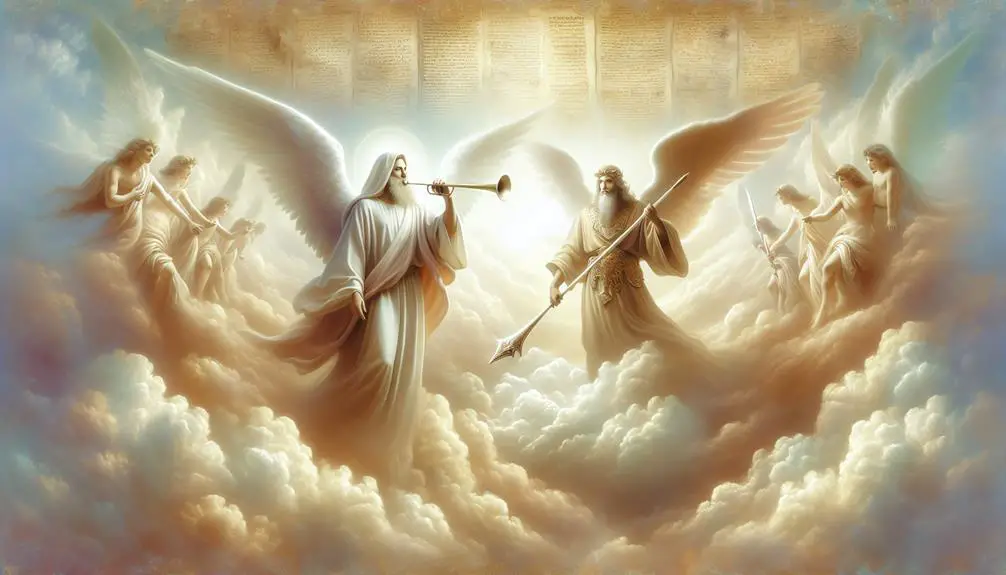
Throughout the New Testament, Gabriel and Michael's roles exemplify divine intervention and messianic fulfillment, underscoring their significant contributions to biblical narrative and theology. As divine messengers, they play pivotal parts in unfolding the story of salvation, directly engaging with humanity to deliver God's messages. Their appearances highlight key theological themes and moments, serving as a bridge between the divine and the human.
Gabriel, known for his annunciation to Mary, marks a cornerstone of Christian faith, heralding the incarnation of Jesus Christ. This act alone places Gabriel at the heart of the New Testament's message of hope and redemption. Michael, on the other hand, is often associated with apostolic visions, providing guidance and protection in times of spiritual warfare. His presence underscores the ongoing battle between good and evil, a central motif in the New Testament writings.
To grasp their importance:
- Divine Intervention: Gabriel and Michael serve as agents of God's will, directly intervening in human history to fulfill divine purposes.
- Messianic Fulfillment: Gabriel's announcement to Mary is a pivotal moment, signifying the fulfillment of Old Testament prophecies concerning the Messiah.
- Apostolic Visions: Michael's role in revelations and visions reaffirms the spiritual support and guidance available to believers, reinforcing the message of hope and perseverance.
Their contributions aren't merely narrative devices but are deeply woven into the theological fabric of the New Testament, offering insights into the nature of divine communication and the spiritual realm's impact on human affairs.
Influence on Christian Thought
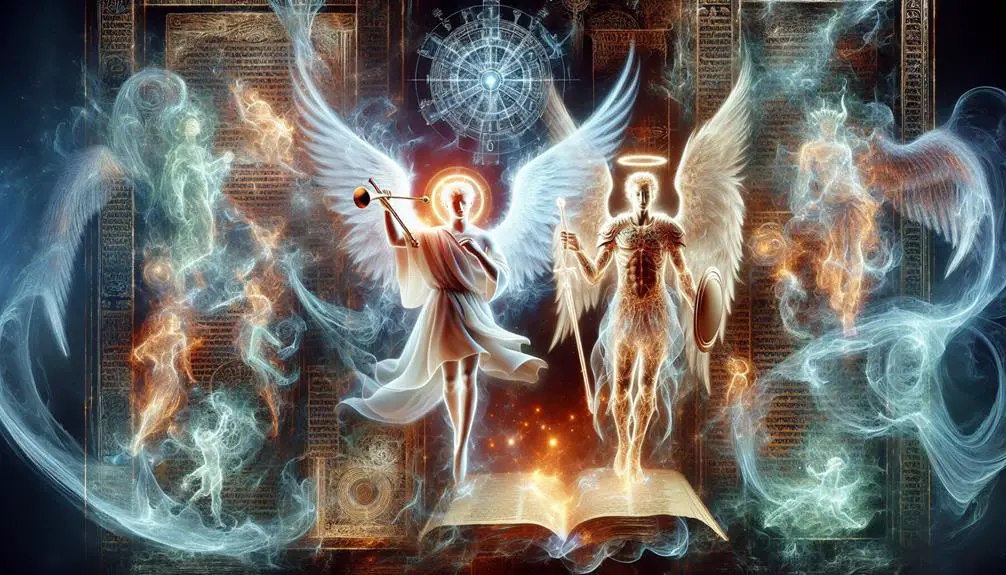
Exploring the profound impact that Gabriel and Michael have had on Christian thought reveals how these celestial figures have shaped theological discourse and believers' understandings of divine interaction. Their presence in the Bible not only illustrates the intricate nature of angel hierarchy but also emphasizes the concept of divine interventions in human affairs. You can't delve into Christian theology without encountering the pivotal roles these archangels play in the narrative of salvation and cosmic struggle.
Gabriel, often seen as the messenger of God, has fundamentally influenced the Christian perception of divine communication. His annunciations to Mary and Zechariah underline the belief in God's direct intervention in guiding and forewarning His people. Through Gabriel's messages, you're reminded of the Lord's ongoing involvement in the world, a cornerstone of Christian faith.
Michael, on the other hand, epitomizes the warrior aspect of divine intervention. His battles, particularly against Satan, underscore the belief in a spiritual war ongoing beyond human sight. His role fortifies the Christian understanding of God's protection over humanity against evil forces. This portrayal of Michael doesn't just contribute to the theology around spiritual warfare but also integrates the concept of an angel hierarchy, with Michael often depicted as the leader of God's armies.
Together, Gabriel and Michael have profoundly influenced Christian thought, embedding the notions of angelic intercession and divine hierarchy deeply within the faith. Their stories serve as critical components of the broader Christian narrative, illustrating how divine interventions and the celestial order are fundamental to understanding God's relationship with humanity.
Frequently Asked Questions
How Do Gabriel and Michael Compare to Angels and Archangels in Other Religious Traditions Outside of Christianity?
When comparing Gabriel and Michael to figures in other religions, you'll find intriguing parallels. In Islamic interpretations, both are revered as archangels, with Gabriel playing a pivotal role in delivering God's messages to prophets.
Zoroastrianism also offers parallels, with figures resembling archangels in their roles as protectors and messengers.
These comparisons highlight a fascinating interplay of divine messengers across different traditions, showcasing a shared spiritual lineage beyond Christianity.
Are There Any Specific Prayers or Rituals in Christian Practice That Directly Invoke Gabriel or Michael for Protection or Guidance?
In a world where spiritual guardianship is sought, you'll find distinct prayers and rituals in Christianity that call upon the angel hierarchy for protection.
Specifically, the 'Archangel Michael Prayer' and the 'Angelus' prayer invoking Gabriel are central protection methods. These practices offer a conduit for divine guidance, embedding the ancient belief in angels' protective powers.
Analyzing these rituals reveals a structured approach to seeking intervention from these celestial beings for guidance and protection.
Have Gabriel and Michael Ever Been Depicted in Major Religious Artworks, and How Do These Depictions Vary Across Different Cultures and Historical Periods?
Yes, in major religious artworks, you'll find Gabriel and Michael depicted with varied artistic symbolism. These depictions change dramatically across different cultures and historical periods, reflecting unique cultural interpretations.
For instance, in Renaissance Europe, they're often shown in intricate detail, symbolizing divine intervention, while in Byzantine art, their portrayals are more iconic, emphasizing their role as messengers.
Analyzing these variations offers deep insights into how societies view celestial figures.
What Are Some of the Lesser-Known Apocryphal Stories or Texts That Feature Gabriel or Michael, and How Do These Stories Contribute to Our Understanding of Their Roles?
Diving into the shadowy depths of apocryphal texts, you'll uncover tales of Gabriel and Michael that paint a richer picture of angelic hierarchies. These stories, steeped in apocalyptic imagery, reveal layers of their roles often overlooked.
Analyzing these narratives, you'll find a nuanced understanding of their influence and duties beyond mainstream accounts. Such exploration adds depth to our comprehension of these celestial beings, showcasing their multifaceted presence across spiritual traditions.
How Have Gabriel and Michael Been Portrayed in Modern Media, Such as Films, Literature, and Television, and How Do These Portrayals Compare to Their Biblical Descriptions?
In modern media, you'll see Gabriel and Michael often reshaped by angel stereotypes and modern reinterpretations. Films, literature, and TV have taken liberties, sometimes straying far from their biblical roots. These portrayals vary, from warriors to messengers, influencing how they're perceived today.
Comparing these to their scriptural descriptions, it's clear there's a blend of tradition and creative liberty, highlighting the evolving nature of their roles in cultural narratives.
Conclusion
In conclusion, you've journeyed through the biblical narrative, discovering that Gabriel and Michael stand as towering pillars in the spiritual architecture of Christianity. Gabriel, the herald of divine messages, and Michael, the unwavering warrior of righteousness, serve not just as celestial beings but as symbols of hope and spiritual resilience.
Like stars guiding ships through the night, their stories illuminate the path for believers, offering insight and inspiration. Their enduring influence on Christian thought is both profound and indelible, echoing through the ages.

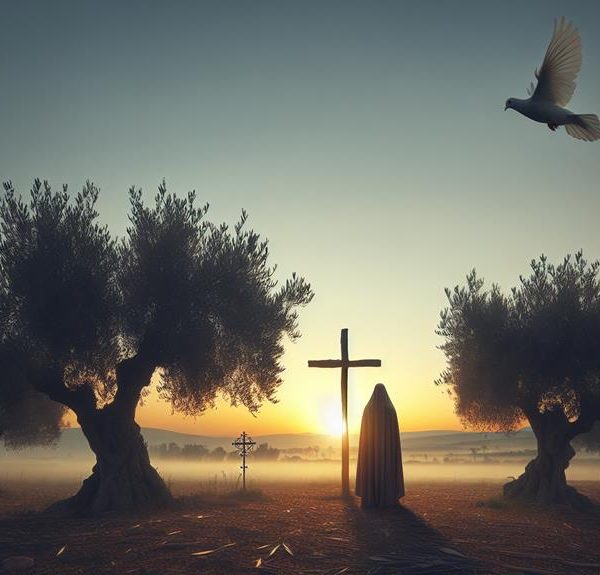

Sign up